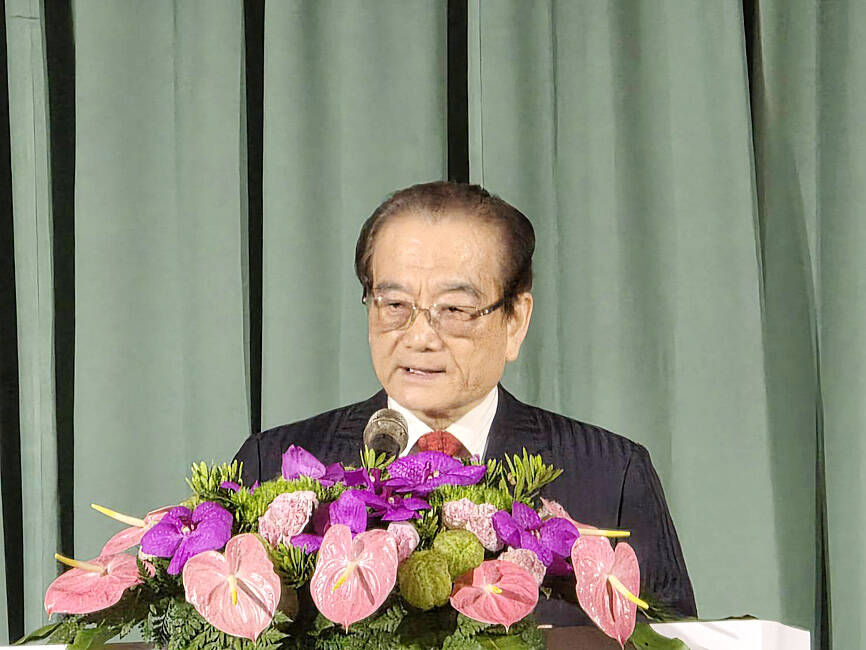Taiwan High Speed Rail Corp and Hitachi Toshiba Supreme Consortium (HTSC) yesterday signed a second supplementary deed to a procurement contract to build new-generation cabins.
The high-speed rail operator purchased 12 sets of rolling stock from Hitachi Toshiba in May 2023. The two companies then spent nearly two years working on the internal designs of the high-speed train cabins, with the first supplementary deed signed last year.
The second supplementary deed was signed by Taiwan High Speed Rail chairman James Jeng (鄭光遠) and HTSC deputy head of Asia and Japan Takuya Yamakawa at the Grand Hotel in Taipei, with Minister of Transportation and Communications Chen Shih-kai (陳世凱) serving as the witness.

Photo: CNA
With the signing of the second supplementary deed, the high-speed rail operator finalized the internal design of the train cabin, allowing HTSC to begin manufacturing the rolling stock.
“That means we have entered the next milestone of rolling stock production,” Jeng said.
“The first batch of the new-generation rolling stock was scheduled to be delivered by the end of next year, but Mr Yamakawa just told me that the delivery could be a few months earlier than scheduled. That would give us more time to test the new trains, making them safer,” he said.
The new trains are scheduled to enter into operation by the second half of 2027, the company said in a statement.
The first and second supplementary deeds helped add a few passenger-friendly facilities and designs to the new train cabins, including upgrading passenger seats to the same specifications of the NS700S Series Shinkansen high-speed trains and installing charging ports at seats. New trains would be equipped with an active shock absorber system.
A noise-reduction device is also to be installed in the passage areas between trains, which can reduce noises and absorb shocks, the company said.
The new train would also have faucets, hooks for clothes and baby seats in nursery rooms, and six spots for passengers in wheelchairs, with devices to secure wheelchairs.
Currently, each train has four spots for wheelchairs.

Three batches of banana sauce imported from the Philippines were intercepted at the border after they were found to contain the banned industrial dye Orange G, the Food and Drug Administration (FDA) said yesterday. From today through Sept. 2 next year, all seasoning sauces from the Philippines are to be subject to the FDA’s strictest border inspection, meaning 100 percent testing for illegal dyes before entry is allowed, it said in a statement. Orange G is an industrial coloring agent that is not permitted for food use in Taiwan or internationally, said Cheng Wei-chih (鄭維智), head of the FDA’s Northern Center for

LOOKING NORTH: The base would enhance the military’s awareness of activities in the Bashi Channel, which China Coast Guard ships have been frequenting, an expert said The Philippine Navy on Thursday last week inaugurated a forward operating base in the country’s northern most province of Batanes, which at 185km from Taiwan would be strategically important in a military conflict in the Taiwan Strait. The Philippine Daily Inquirer quoted Northern Luzon Command Commander Lieutenant General Fernyl Buca as saying that the base in Mahatao would bolster the country’s northern defenses and response capabilities. The base is also a response to the “irregular presence this month of armed” of China Coast Guard vessels frequenting the Bashi Channel in the Luzon Strait just south of Taiwan, the paper reported, citing a

The Chinese military has built landing bridge ships designed to expand its amphibious options for a potential assault on Taiwan, but their combat effectiveness is limited due to their high vulnerability, a defense expert said in an analysis published on Monday. Shen Ming-shih (沈明室), a research fellow at the Institute for National Defense and Security Research, said that the deployment of such vessels as part of the Chinese People’s Liberation Army (PLA) Navy’s East Sea Fleet signals a strong focus on Taiwan. However, the ships are highly vulnerable to precision strikes, which means they could be destroyed before they achieve their intended

UNDER PRESSURE: The report cited numerous events that have happened this year to show increased coercion from China, such as military drills and legal threats The Chinese Communist Party (CCP) aims to reinforce its “one China” principle and the idea that Taiwan belongs to the People’s Republic of China by hosting celebratory events this year for the 80th anniversary of the end of World War II, the “retrocession” of Taiwan and the establishment of the UN, the Mainland Affairs Council (MAC) said in its latest report to the Legislative Yuan. Taking advantage of the significant anniversaries, Chinese officials are attempting to assert China’s sovereignty over Taiwan through interviews with international news media and cross-strait exchange events, the report said. Beijing intends to reinforce its “one China” principle